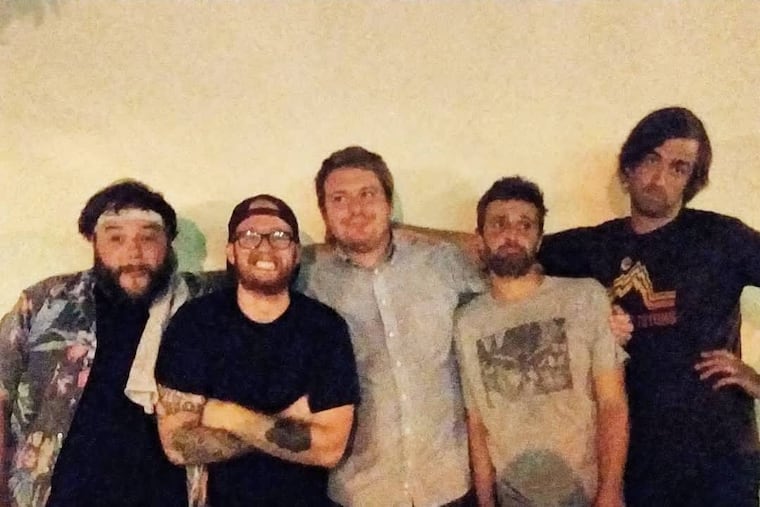Why the Pa. suburbs created some of the decade’s best indie bands
Algernon Cadawallader turns 10, while other PA emo bands flourished

Philly’s folk-rocking Hop Along is continuing its shot at national renown — with a January appearance on CBS This Morning and a prominent slot at 2019’s Coachella. Yet Hop Along guitarist-composer Joe Reinhart is pausing to celebrate the tenth anniversary of Yardley’s late emo ensemble Algernon Cadwallader — the snarky-smart quartet where he got his start — with surprising reissues of its catalog in January on Lauren Records.
“I didn’t even realize they had gone out of print,” Reinhart says of Cadwallader albums such as its self-titled debut, Parrot Flies, and Some Kind of Cadwallader. “Or that interest would be so high, and loud, as to warrant new stories and reissues. That’s crazy that it’s even 10 years. Now that they’re being heard again, I’m excited. I wanted to hear them.”
Algernon Cadwallader is one of many smart emo bands founded beyond Philly’s city limits to celebrate their first decade recently — including Balance and Composure (Doylestown), Snowing (Lehigh Valley), Title Fight (Kingston), the Wonder Years (Lansdale), and Menzingers and Tigers Jaw (Scranton). With all these bands together, a portrait emerges: one of like-minded teens creating independent scenes in their hometowns and other Pennsylvania suburbs.
“This grouping of bands made passionate, unique music with an underlying working-class spirit,” says Tigers Jaw’s Benjamin Walsh. “We came from small cities with not a lot of support for the arts, so it was incumbent upon the bands to work together to build a scene out of nothing. The Scranton/Wilkes Barre area had few all-ages venues, so art galleries, basements, church picnics, and even hair salons became our early venues. It was a way to escape boredom and [provide] a scene that gave a sense of belonging to all different walks of life.”
That by-the-bootstraps sensibility led to unity among these bands. “I think the DIY-minded approach taken by these area bands led to an inspirational hive-mind to motivate and support each other, rather than compete and worry about who has a booking agent, or how many followers they have on the internet, or who has a manager,” says Walsh. “Our band is still self-managed. These bands were and are making art on their own terms, and that’s the best basis for longevity. There is a purity to that era in that it’s untouched by outsider-industry influence.”
The influence of these bands has outlived some of the acts themselves, and in the ensuing years, groups have found a broader audience to appreciate it. “I grew up on the East Coast at that time, so I can definitely tell you that Cadwallader, Wonder Years, and Tiger’s Jaw not only inspired what we do, but all of the bands we spin and host,” says Morgan Freed, one of the founders of the Los Angeles band Emo Nite. Freed’s emo DJ parties, often featuring live acts, branched out from L.A. since their start in 2014 and will hit Philadelphia’s Voltage Lounge on Feb. 2. “There’s a certain brand of smarts and quirk to those emo bands that you really don’t hear anywhere else.”
Of that Pennsylvania emo scene miles from Philly, Walsh says there was an insularity to it at first, but that eventually the City of Brotherly Love became a beacon for indie bands of their ilk. “Even though it was only 90 miles away from Scranton, I never went to shows in Philly growing up,” says Walsh. “The Philly scene was definitely romanticized early on, so I’d say that it was a reward in that it was a bigger city with a wealth of both DIY and legitimate all-ages venues when we finally got there.”
Reinhart’s Algernon Cadwallader may have broken up (“A band member was having a baby and passing a hat around for gas money was not going to be able to support that”), but it is still among the building blocks of Hop Along’s sound. “That band was my baby.”
But the guitarist is quick to mention that their small but devoted audience at the time was pretty much made up of fellow Pennsylvania emo bands they hung with. “We were often our own audiences, the only ones filling the room and the hat,” he laughs. “We split pizzas after the gigs and thought we were living like kings. If you told us then that we would be selling out big rock rooms in 10 years, we all would’ve been like, ‘Yeah, right.' ”